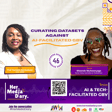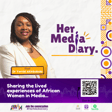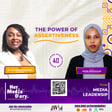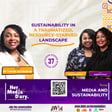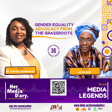Become a Creator today!Start creating today - Share your story with the world!
Start for free
00:00:00
00:00:01

SPECIAL SERIES: Labour Migration Reporting Ep 2: Reporting trends on the continent
This podcast series looks at labour migration in Africa, and focuses on how women experience it on different levels. It highlights how African women experience labour migrations locally, regionally and internationally; featuring expert analysis and tips for journalists who report on labour migration issues.
In this episode we discuss:
- Labour migration reporting trends in Africa with Sumeya Gasa, award-winning multimedia journalist and former AWiM News Editor in Chief
- Terms used in migration with Racha Haffar, an award-winning women's rights activist from Tunisia and founder and president of Not 4 Trade
Hosted and produced by Andy Mkosi for African Women in Media
Read the labour migration newsletter that looks into the effect of the pandemic on migrant workers and offers story ideas for journalists here
Transcript
Introduction to the Podcast Series
00:00:00
Speaker
Welcome to the second episode of the African Woman in Media Labor Migration Podcast, a four-part series contextualizing labor migration on the continent. I'm Andim Korsi, a multidisciplinary artist who is based and works in Johannesburg.
Trends in Reporting on Labor Migration
00:00:19
Speaker
In this episode, we take a look at the reporting trends and convention when it comes to labor migration and women on the continent. We also define and break down some migrant terms with the help of Russia Hoffa, an award-winning women's rights activist from Tunisia, and the founder and president of Not For Trade.
00:00:48
Speaker
some news around migration. In November 2020, the United Arab Emirates stopped issuing new visas to citizens of 13 mostly Muslim-majority countries, including Iran, Turkey, Syria and Somalia. This is according to a document issued by a state-owned business park. The document cited an immigration circular that came into effect on November 18.
00:01:12
Speaker
And as Trump's time in the White House comes to a close, a federal charge has ordered the Trump administration to stop expelling immigrant children who cross the southern border alone, halting a policy that has resulted in thousands of rapid deportations of minors during the coronavirus pandemic.
Misconceptions About African Migration
00:01:43
Speaker
Africa is often seen as a continent of mass migration and displacement caused by poverty, violent conflict and environmental stress. Yet such perceptions are based on stereotypes rather than theoretically informed research.
Ethics in Labor Migration Reporting
00:01:56
Speaker
In a course developed by Aawam News Editor-in-Chief Sumaya Kasa, the multi-award-winning multimedia journalist discusses how journalists can avoid some of these harmful reporting trends.
00:02:08
Speaker
So the course that I developed for RWIM's labor migration reporting program was ethics and coverage of labor migration. The focus of the course was to first of all look at the trends around labor migration reporting on the continent, which includes both reporting that is done by Africans and the West, sort of comparing what established tropes exist and
00:02:35
Speaker
analyzing their nature in terms of labor migration and ethical practice. One of the things we sought out to address with this course was that a lot of the established tropes and practices are problematic and
00:02:49
Speaker
They are counterintuitive to the ideal of making the labor migration process for Africans and more specifically African women a better process both in terms of policy and just sort of the regional attitudes towards labor migrants.
00:03:07
Speaker
The three main things that I wanted participants to take away from the course was, first of all, the idea of ethics and the very basics of journalism and how we can actually expand on that into the field of constructive journalism, which is a new and emerging field. So with constructive journalism, it's about getting the holistic picture and
00:03:28
Speaker
telling stories in a way that really takes into consideration the context that each story comes from. And I think in a way that approach addresses a lot of these played out problematic practices that have become so normalized in our reporting. The second thing was being very conscious about language. Language is a huge propellant for
00:03:51
Speaker
dehumanizing biases that are very common in the discourse around labor migration and also representation. So these two are very closely linked to the representation of labor migrants and also the way that we speak about them. So we looked at language in terms of
00:04:08
Speaker
the written word and the words that we use to describe people and described things in general and also how we represent people visually and how we represent these stories visually. Making sure that in our representation we give people the opportunity to self-identify
00:04:28
Speaker
while keeping within the spectrum of journalism and journalism ethics. For instance, where people are often referred to as victims of something, when they have indeed overcome that something, we can refer to people as survivors of a particular thing. So that's just one example of how we brought home the notion of self-identification and just ethical
00:04:52
Speaker
considerate and constructive representation.
Language and Bias in Reporting
00:04:55
Speaker
Some of the problematic practices include the words that people use when describing others. For instance, South Africa, where I am from, is a very Afrophobic, xenophobic country. And I specifically say Afrophobic because our xenophobia seems to be reserved solely for fellow Africans as opposed to any foreigner, including white foreigners.
00:05:18
Speaker
So in South Africa, even with the media, when we write the word foreigner or refer to people as foreigner, it's never to refer to white people who are not from South Africa. It's always to refer to fellow Africans from other African countries. So that's one thing. And the problem with that word and the way it's used in media and in society is that
00:05:44
Speaker
Automatically you identify a person as an outsider, so you other them. Secondly, already that position of being an outsider comes with a lot of these harmful connotations and harmful biases. So that's one word. And then another word that we spoke about was actually the word exotic. You know, I think in the past people thought of the word exotic as some sort of compliment or, you know, like it seems innocent at the very least.
00:06:11
Speaker
But it is another way that people are dehumanized. I use an example where a journalist was writing about Senegalese food and he says, you can smell the exotic spices and rice and fish cooking. And I'm just saying, the spice is not exotic because when you describe people as exotic, you are centering your identity and your lived experience.
00:06:36
Speaker
as a means to judge the other person's experience so now that's automatically othering them because to me the spices I use at home are not exotic they're just the spices I use at home because that's my reality so I think it's a matter of getting journalists to think about how we write about people and how we tell these stories whether it's visually or through audio
00:06:57
Speaker
I think the idea is to get journalists to tell these stories in ways that do not other people and do not propagate these already established harmful stereotypes and narratives. So I think also in the way that things are being done right now within AWIM and the courses that we're developing, it's very much centered around the
00:07:24
Speaker
a greater African context as a way to understand and to apply these ethics into smaller contexts. So the idea is to always get journalists to think about the fact that every story has multiple intersecting contexts and those multiple intersecting contexts
00:07:44
Speaker
have a real impact on people's lives. So we need to be very conscious and aware of how we represent and tell these stories because we don't want to contribute further to harmful narratives. So it's about changing those already established harmful narratives. I do think that we often reiterate what we've heard. So we create an echo chamber of our own as the media.
00:08:08
Speaker
So, for instance, let's say there's a phrase that's being used to... Let me just think of popular phrases that are used all the time. Remember how before state capture became a thing, it was corruption, corruption, corruption. Now everyone is asked, state capture, state capture, you know.
00:08:29
Speaker
Or automatically, when we speak about African corruption, then it's just corruption, but when it's other, when it's non-African entities, then it's referred to as irregularities.
00:08:43
Speaker
The point I'm trying to make is that, so regardless of what the phrase, like some of these phrases are not necessarily harmful phrases, but we become an echo chamber. So we sort of like fall back on whatever phrase that's very popular and used often to describe a certain thing.
00:09:05
Speaker
And I think it's the same thing that happens with problematic phrases and problematic representation. For instance, during Fismus fall, there was a lot of these images of women in dukes, you know, and then everyone started wearing dukes and just generally like it became a big thing. And I think it's the same thing that happens the same way that the media influences people, people influence the media.
00:09:32
Speaker
and then also the media influences the media. So if people are constantly reporting about something a certain way then we start using those kind of representative tropes. I think to some point words lose their meaning and to some point the meaning of words gets changed.
00:09:50
Speaker
I think with African women, the knee jerk reaction to telling African women stories is to find the victim angle.
Critique of Victim Journalism
00:10:00
Speaker
And this is something we call victim journalism. And I completely understand the human instinct to represent these stories and to represent the stories in a particular way, which we call victim journalism.
00:10:14
Speaker
The thinking is that people will read it and it will appeal to the human sense of empathy. And if it reaches the right person, maybe we'll see change. According to Sumaya Kasa, victim journalism is harmful in that it only portrays people as helpless, whereas in some cases, the people being written about have survived whatever they were victims of. She continues to say this approach desensitizes people. So we get to a point where we either feel that this is normal,
00:10:42
Speaker
This is what happens. There's nothing we can do about it. It's never changed. So it's not going to change. Whereas with ethical journalism and specifically constructive journalism, when you tell a story in a way that is holistic, that considers all the different elements,
00:11:00
Speaker
you then get the opportunity to present people as complex beings, people who've had lives before they had to migrate for labor, people who experienced terrible things during labor migration, but also people who are overcoming those things.
00:11:18
Speaker
Apart from the people, you get to tell a story that actually looks at policy and what needs to be changed. Because if we're focusing on just how terrible things are, and we're not looking at the policies that are actually enabling these terrible things, we're not doing much in terms of what we envision the service of journalism to be beyond the storytelling aspects of it.
00:11:51
Speaker
You can read up more on the above via our newsletter which you can subscribe to on our website AfricanWomenInMedia.com
00:12:03
Speaker
My name is Rasha Haffar. I am a Tunisian anti-human trafficking and anti-modern slavery activist.
Legal Protections for Migrants
00:12:11
Speaker
Rasha Haffar produced a course for Aawam around understanding human and labour rights of migrants. The course is called understanding human and labour rights for migrant workers. It's basically shedding light on the
00:12:31
Speaker
international instruments and also on the regional and local instruments around Africa that are used to protect the rights of migrants and also migrant workers. And it also showcases the difficulties migrants face and the violations that they fall in because of the lack of implementation of the international and regional and local instruments.
00:12:59
Speaker
So we wanted to shed light on actually the rights migrant workers have that are supposed to be granted by international laws and regional laws. Rasha Hafar says local laws fall short in protecting migrants because some host countries do not implement the rights and laws meant for migrants. In these cases, migrants find themselves vulnerable in situations when their rights are violated. We talk about the major
00:13:28
Speaker
global instruments, for example, the International Convention for the Protection of Migrant Workers, their families, the ICRMW. It's a great international instrument, but it doesn't have a lot of signatories, especially from the countries that are receiving
00:13:48
Speaker
like the destination countries because they do not want to grant irregular migrants same rights as regular migrants and this is what the the convention emphasizes on is protecting irregular migrants rights just like regular migrants so the international convention on the protection of
00:14:06
Speaker
the rights of all migrant workers and their families. For example, some of the most important rights are the right to life, liberty and security, freedom from arbitrary arrest or detention, and the right to seek and enjoy asylum from persecution, the freedom from discrimination,
00:14:27
Speaker
the right to be protected from abuse and exploitation, freedom from slavery and forced labor and human trafficking, the right to fair trial and legal redress. Migrants should have the access to courts, should have access to legal procedures, protection of economic, social, and cultural rights, including the right to health and adequate standards of living, social security, adequate housing, education,
00:14:57
Speaker
and also favorable conditions of work. So these are some of the rights. There's also the right to form associations and the right of forming unions. There's also political rights where they can run for office or vote or
00:15:15
Speaker
So these are some of the rights, but a lot of them are, of course, not respected. The right to social security, the right to physical and mental health. The majority of the rights are for migrants. Some of them protect irregular migrants. And that's why I wanted to pay specific attention to the ICRMW, the International Convention for the Protection of Migrant Workers and their Families, because it's the International Instruments
00:15:45
Speaker
that actually puts irregular migrants as equal as regular migrants when it comes to their rights. But that instrument doesn't have enough ratifications globally. So for example, in Western Europe, which are the destination countries for so many migrant workers or migrants from either Asia or Africa, none of the countries have ratified it. They don't want to give irregular migrants same rights as regular migrants.
00:16:15
Speaker
There's also only 15 countries in Africa that actually ratified it as well. Human trafficking is defined as the exploitation of someone into either sexual services or labour or slavery-like practices through the use of force, fraud or coercion.
00:16:41
Speaker
And then that person finds themselves in a situation where they cannot escape. They cannot get out of it. So human trafficking needs to have three elements. It's called the AMP model, which is the action. So the action and then the means and then the purpose.
00:17:00
Speaker
So you need to have an action which is either the recruitment, the transportation, the harboring, the receipt of a person, you know, in that situation and then plus a means. So the means could be either the force, the fraud or the coercion.
00:17:16
Speaker
And then leading to the purpose of that exploitation, which is the commercial sexual act or the labor services exploitation or the slavery like practices. You need to have one of each of these elements in order to call it a crime of human trafficking.
00:17:33
Speaker
So human trafficking is a crime against individuals. These people do not know they are entering a situation of trafficking and they do not approve it and they do not know how to get out of it.
00:17:47
Speaker
However, migrant smuggling is a contract.
Difference Between Human Trafficking and Smuggling
00:17:52
Speaker
It's a service that is provided by the smuggler who has a means of transportation across border and they charge the person an amount of money. So it's an exchange of service. So I come to you and I say, I want you to take me across the Mediterranean.
00:18:11
Speaker
How much do you charge? You tell me how much you charge. I pay you. You give me a ride. And then when I arrive to the country, I become an irregular migrant. And therefore, I am committing a crime against the state or the country by being irregular, by not taking the regular routes of
00:18:33
Speaker
entering a country. So it's a crime against the country or the state and it's always across borders. However, human trafficking is a crime against individuals and it can happen locally and across borders.
00:19:02
Speaker
Thank you so much for joining the second episode of African Women in Media Labor Migration Podcast.
Engagement and Social Media Interaction
00:19:08
Speaker
Please keep the conversation going on social media. On Twitter, we are at realawem, Facebook, African Women in the Media, Instagram, African Women in the Media. Till the next episode.
00:19:27
Speaker
This is a limited podcast series in partnership with the Joint Labor Migration Program, the African Union Commission, International Organization for Migration and the International Labor Organization.





